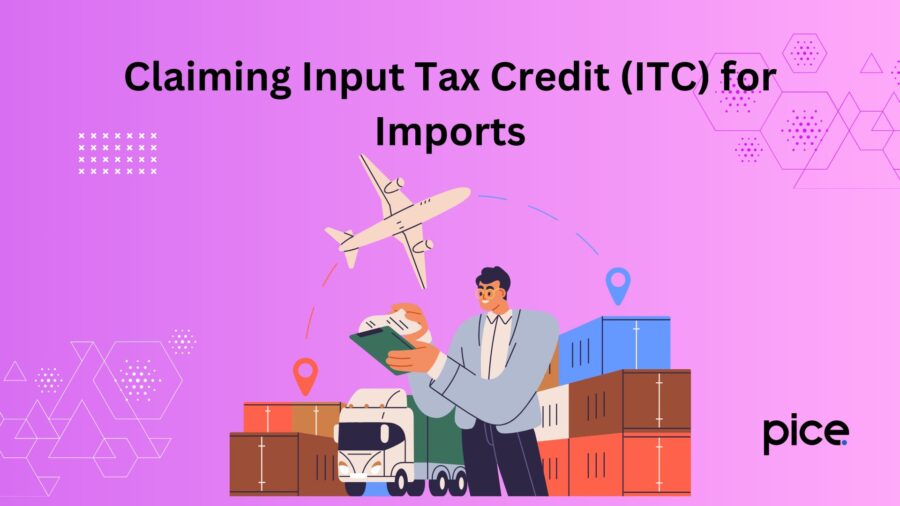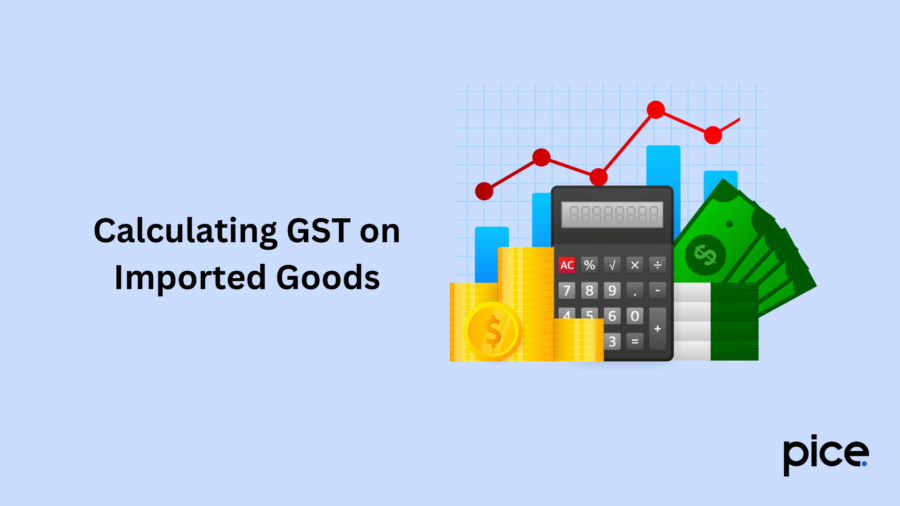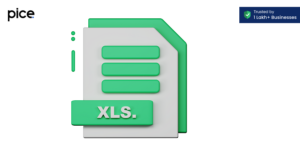Claiming Input Tax Credit (ITC) for Imports
- 17 Dec 24
- 13 mins

Claiming Input Tax Credit (ITC) for Imports
- Key ITC Requirements for Imported Goods Under GST
- Necessary Documentation for ITC Claims on Imports
- Understanding GST on Imported Goods
- Fundamentals of GST on Imported Items
- Effects on Pricing and Cost Structure
- Compliance Standards for ITC on Imports
- Maintaining Accuracy in ITC Claims for Imports
- Long-Term Advantages of ITC Compliance
- Calculating GST on Imported Goods: Taxation Structure Explained
- GST Credit Rules for Imported Goods
- Conclusion
Key Takeaways
- Importers can claim Input Tax Credit (ITC) on IGST paid for imported goods, provided the goods are used for business purposes and they comply with GST documentation requirements.
- Necessary documents for ITC claims include GST invoices, bills of entry, import-export codes (IEC), debit notes, and delivery challans.
- GST on imports is calculated as IGST along with Basic Customs Duty (BCD), and compensation cess may apply based on the type of goods.
- Proper compliance, including invoice reconciliation, product classification, and timely return filing, is crucial to ensure accurate ITC claims and avoid penalties.
- Claiming ITC on imports improves cash flow, reduces tax liabilities, and enhances financial health, supporting business growth and credit ratings.
The provision to claim input tax credit of IGST paid on imports is an advantage for importers in India. It helps them reduce their tax liabilities while improving cash flows for their business. To be eligible to claim input tax credit (ITC), importers need to comply with the GST and ITC rules and documentation. Learn about the rules and documentation in detail here.
Key ITC Requirements for Imported Goods Under GST
Imported goods are categorised as interstate supplies. As a result, the government imposes integrated taxation (IGST - Integrated Goods and Services Tax) and basic customs duty (BCD) on imported goods. The collection of input tax credits on imported items needs to have a legitimate tax invoice or additional authorised documentation.
Here are the other ITC requirements under GST for imported items:
● GST Registration
If the turnover of an importer exceeds the threshold limit, he/she has to register under the GST scheme. The importer will need a GSTIN (Goods and Services Tax Identification Number) to continue import activities.
● Eligible Goods
Imported items are eligible for ITC claims if they are associated with the taxable supplies of companies. In other words, ITC applies to products and services used for commercial or business purposes and not for non-business or personal purposes.
● Registered Person
Importers need to be a registered person under the GST regime to claim ITC. Unregistered companies are ineligible to collect ITC.
● Customs Duty and IGST
In the case of imported goods, ITC applies to IGST and customs duty, besides GST. However, importers can claim ITC on customs duty if the goods are used for business purposes.
💡 If you want to pay your GST with Credit Card, then download Pice Business Payment App. Pice is the one stop app for all paying all your business expenses.
Necessary Documentation for ITC Claims on Imports
Here are the documents required for ITC claims on imports:
● Import-Export Code (IEC)
An importer needs IEC and PAN (Permanent Account Number) to send shipments, clear customs, receive money and transfer funds in foreign currencies. As a result, an importer has to submit an online application for IEC to the Joint Directorate General of Foreign Trade (DGFT).
● Bill of Entry
Customs officials issue a bill of entry to importers mentioning the importer’s identity, quantity of goods, description of goods, value and taxes paid. An importer needs to possess a bill of entry to claim ITC.
● Debit Note
The supplier of services or products issues a debit note as per the provisions of Section 34. An importer has to possess the debit note to claim ITC.
● Invoice
Input Service Distributor (ISD) has to issue an invoice or credit note as per GST invoicing regulations. It is essential to have this document to claim ITC.
● Compliance with Import Licence
As an importer, ensure you have the necessary license to carry out imports. Your ITC claims can be obstructed due to non-compliance with import restrictions.
● Delivery Challan
If you are an importer, ensure you have a delivery challan when goods are moved from one place to another. Further, you need to have the document highlighting IGST paid on imports.
● Details of Capital Goods
Compile capital goods invoices mentioning the amount, type and value of goods. Ensure distribution of ITC over several tax periods if applicable.
Understanding GST on Imported Goods
GST has replaced multiple taxes, including education cess, safeguard duty, basic customs duty, anti-dumping duty and other charges levied on the import of goods. Extra customs taxes have been eliminated with the introduction of GST in 2017.
Import of goods is considered inter-state trade wherein integrated tax applies under Article 269A of the GST rules. Here is the basic calculation of tax or GST on an imported good with an assessable value of ₹600:
Assessable Value: ₹600
Basic Customs Duty: ₹60
Integrated tax = 18% of (₹600 + ₹60) = ₹118.80
Thus, the total tax amounts to ₹178.80, including integrated tax and basic customs duty. Additional cess might apply based on other aspects.
Fundamentals of GST on Imported Items
A supply of service by an individual outside India to an individual in India is referred to as import. The import of services and goods is considered as supply irrespective of the purpose of the import process, under Section 7 (1) (b) of the Central Goods and Services Tax Act (CGST Act), 2017.
In addition, if a registered taxable individual imports services from relatives or distinct individuals, it will be considered as supply irrespective of the purpose of import under Schedule 1 of the Central Goods and Services Tax Act, 2017. This rule is defined under Section 25 of the Central Goods and Services Tax Act, 2017.
Effects on Pricing and Cost Structure
The introduction of GST in 2017 has changed the taxation system of transportation, logistics expenses and goods. Regardless of whether goods were imported or exported, shipping costs attracted service tax.
Additionally, there were terminal fees, cargo handling tax obligations and storage on primary services. However, after GST implementation, logistics and commodities forwarding are categorised as services that include the transportation of goods. GST applies to the entire value of supplies and the tax rate on goods charges remains the same as the rate on items delivered.
If goods are billed separately, the transportation GST rate applicable is 5%. Notably, transportation of necessary goods might be excluded from GST norms. The place of delivery is an important aspect that determines interstate supplies and the GST rate. The GST rate differs for domestic and foreign shipments.
Compliance Standards for ITC on Imports
Businesses need to comply with GST regulations to avoid legal consequences and penalties. Here are the standards for ITC on imports:
● Frequent Audits
Conducting periodic internal audits can help businesses identify fixable inconsistencies. Rectifying the same helps them comply with GST laws while they raise ITC claims.
● Proper Product Classification
Businesses might face challenges if they classify their products incorrectly. The imposition of penalties and recovery of costs reduces their profitability. Ensure you classify your products correctly.
● Timely Return Filing
The return filing period varies based on the business revenue. Importers need to file returns quarterly or monthly based on the revenue of their business. The returns contain details about outgoing supplies, inward supplies, ITC claims and taxes paid.
● Valuation of Imported Goods
It is essential to determine the value of imported goods in accordance with Customs Valuation Rules for GST compliance. Ensure you determine the value of imported items effectively.
● Invest in Compliance Software
Integrating compliance software can help automate operations. It presents a centralised platform to track and manage compliance needs, ensuring accuracy in tax calculations.
Maintaining Accuracy in ITC Claims for Imports
Here are the aspects to follow for accuracy in ITC claims:
● Invoice Reconciliation
Regular reconciliation of records and invoices helps resolve differences immediately. This further ensures that the taxes paid on imported goods are reflected accurately in the ITC claims.
● Document Cross-Verification
Ensure to cross-check the tax invoice and the bill of entry. Verifying these can help you check if the narratives of the imported goods are mentioned accurately. It is crucial to make the details accurate for ITC claims.
● Employee Training
Investing in staff training can help them understand the GST requirements and the process of ITC claims. As a result, they will likely align the business activities for seamless ITC claims in accordance with the GST regulations.
● Communicating with Vendors
Effective communication with your foreign suppliers can help you with complete and precise tax invoicing. It is crucial to have accurate tax invoices for ITC claims and reduce mistakes in such claims.
Long-Term Advantages of ITC Compliance
Here are the benefits of ITC compliance:
● Cost Optimisation
ITC claims for taxes paid on imported goods reduce the tax liability of businesses. These savings grow over time to improve the financial health of companies. As a result, cost optimisation is one of the advantages of ITC compliance.
● Making Strategic Decisions
ITC compliance helps businesses get a precise and transparent idea of their financial health. As a result, they can make strategic decisions pertaining to finances with regular and precise ITC claims.
● Resource Allocation
Non-compliance with ITC and GST rules results in the imposition of penalties and legal consequences. Compliance with ITC rules helps businesses streamline their operations by allocating resources like time, finance and labour on other functional areas of companies.
● Improved Cash Flows
Accurate ITC claims help businesses improve their cash flows. It ensures an uninterrupted supply of working capital based on input tax payment deduction from output tax liabilities. Thus, financial stability is the outcome for businesses complying with ITC norms.
● Favourable Impact on Credit Rating
Creditors and financial institutions periodically evaluate the creditworthiness of businesses based on their compliance history and financial stability. Compliance with ITC criteria helps businesses improve their credit rating. An improved credit rating can additionally make businesses eligible for loans and partnerships.
Calculating GST on Imported Goods: Taxation Structure Explained

Here is how to calculate GST on imports under several circumstances:
1. IGST Without Countervailing Duty
Here is the calculation:
Assessable Value = ₹600
BCD = 10% of Assessable Value = ₹60
Education Cess = 2% of BCD = ₹1.20
Higher Education Cess = 1% of BCD = ₹0.60
IGST = 12% of Summation of all the components mentioned above = ₹79.42
2. IGST with Compensation Cess and Without Countervailing Duty
Assessable Value = ₹600
BCD (basic custom duty calculation) = 10% of Assessable Value = ₹60
Education Cess = 2% of BCD = ₹1.20
Higher Education Cess = 1% of BCD = ₹0.60
IGST = 12% of the Cumulative sum of all the components mentioned above = ₹79.42
Compensation Cess = 10% of (Assessable Value + BCD + Education Cess + Higher Education Cess) = 10% of (₹600 + ₹60 + ₹1.20 + ₹0.60) = ₹66.18
3. IGST with Countervailing Duty
Assessable Value = ₹600
BCD = 10% of Assessable Value = ₹60
Countervailing Duty = 12% of (Assessable Value + BCD) = ₹79.20
Education Cess = 2% of (Countervailing Duty + BCD) = ₹2.78
Higher Education Cess = 1% of (Countervailing Duty + BCD) = ₹1.39
IGST = 28% of Summation of all the elements mentioned above = ₹208.14
4. IGST with Countervailing Duty and Compensation Cess
Assessable Value = ₹600
BCD = 10% of Assessable Value = ₹60
Countervailing Duty = 12% of (Assessable Value + BCD) = ₹79.20
Education Cess = 2% of (Countervailing Duty + BCD) = ₹2.78
Higher Education Cess = 1% of (Countervailing Duty + BCD) = ₹1.39
IGST (integrated tax rate) = 28% of Sum of all the elements mentioned above = ₹208.14
GST Compensation Cess = 10% of (Assessable Value + BCD + Countervailing Duty + Education Cess + Higher Education Cess) = ₹74.34
GST Credit Rules for Imported Goods
Here are the two types of credits pertaining to imports:
● Credit for Customs Duty: As an importer, you need to pay customs duty on your imports. However, the GST laws allow you to claim credits if the imports are for your business.
● Credit for IGST: Importers have to pay IGST on the imported goods. They can claim the credits on IGST as per the GST regulations.
Here are the important factors about GST credit for imported items:
● Reverse Charge Mechanism (RCM):
The recipient of products or services needs to pay taxes under the reverse charge mechanism, instead of suppliers. As a result, if a business imports services under RCM, it is liable to pay GST while claiming ITC.
● Time of Supply:
An importer can claim ITC in the same month if he receives products before the end of the month in which the tax invoice is raised. It is crucial to record transactions at the right time for ITC claims in the supply chain.
● Invoice Checking:
ITC claims need to be supported by relevant documents. Ensure you check the details on the invoice provided by your seller, including details like the item purchased, the amount paid and GST if applicable.
Conclusion
Importers can claim an input tax credit of IGST paid on imports in addition to ITC on customs duty. This helps them reduce their outward tax liabilities on outward supply while ensuring financial stability. An improved financial health of import businesses can help them acquire notable credit ratings which can further help them get loans and partnerships for business furtherance and growth.
 By
By 
















